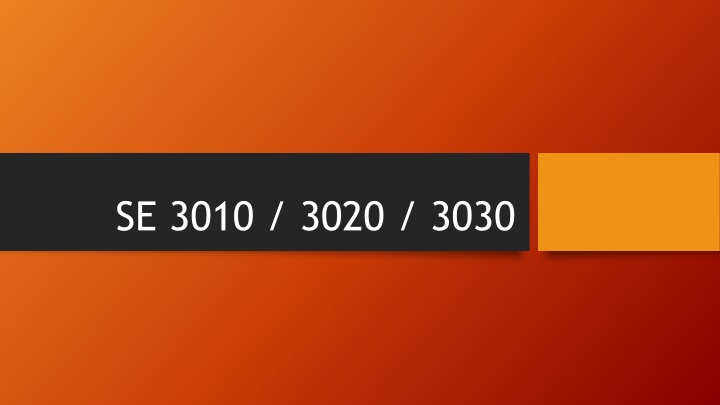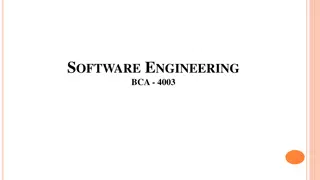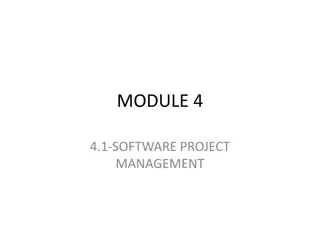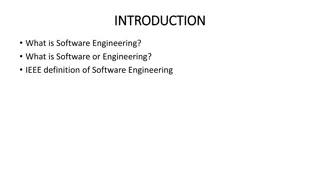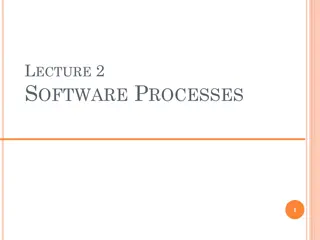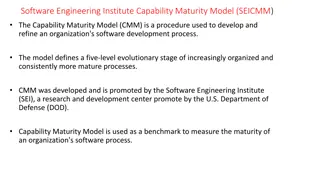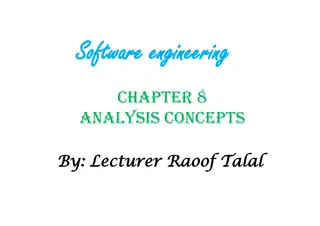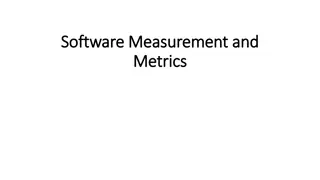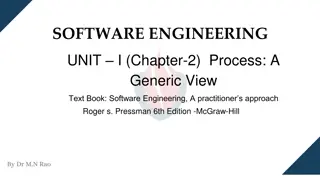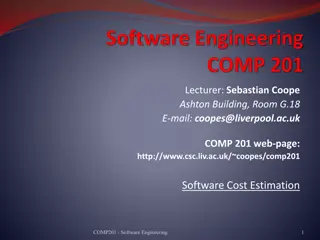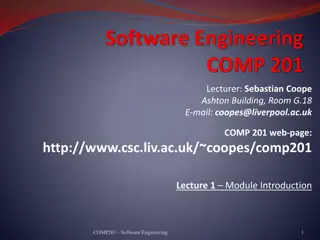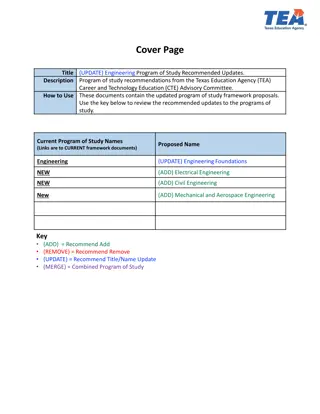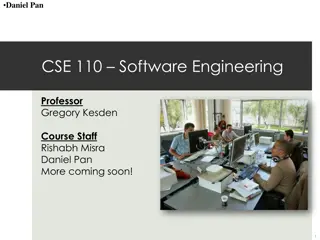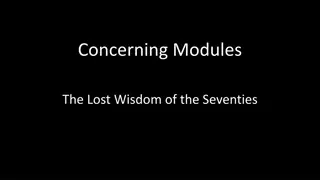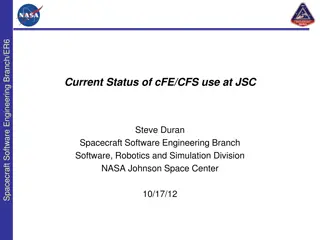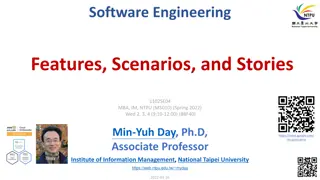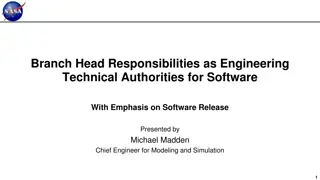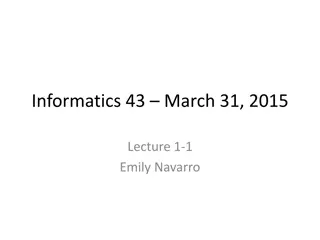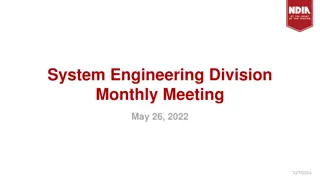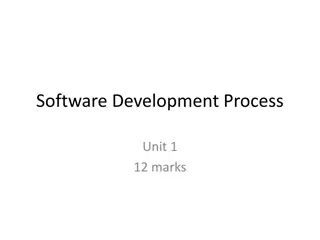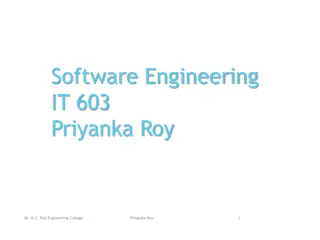Software Engineering Project Management Framework Overview
This document outlines a comprehensive software engineering project management framework focusing on building an open-ended system as a team. It covers goals, structure, key policies, and a detailed framework using Scrum methodology. Key elements include sprint structures, key policies around attendance and tardiness, and details on Scrum artifacts and roles. The framework emphasizes real customer requirements, multiple viewpoints, technical skill development, and continuous process improvement.
Download Presentation

Please find below an Image/Link to download the presentation.
The content on the website is provided AS IS for your information and personal use only. It may not be sold, licensed, or shared on other websites without obtaining consent from the author.If you encounter any issues during the download, it is possible that the publisher has removed the file from their server.
You are allowed to download the files provided on this website for personal or commercial use, subject to the condition that they are used lawfully. All files are the property of their respective owners.
The content on the website is provided AS IS for your information and personal use only. It may not be sold, licensed, or shared on other websites without obtaining consent from the author.
E N D
Presentation Transcript
Goals Build an open-ended system as a team Open-ended: requirements from a real customer Team: benefit from multiple viewpoints Learn new technical skills Experience with process; building on SE 2800 Apply Scrum: 3 sprints per quarter Later in the year: focus on process improvement Apply SE 3800, 3821 Continuous integration, gathering requirements Not co-requisites; if taken later, then it feeds the other direction
Structure Three 3-week sprint + 1 flex week SE 3010: flex week is the first week 1stweek: meet w/ PO, schedule ceremonies, start backlog Sprint 1: Primary user stories, storyboards, mockups Sprint 2: Design, software spike for entire solution Spikes are throw-away code focusing on project technologies Sprint 3: First releasable increment Final exam: presentations covering project progress, lessons learned
Key policies Attendance required Lab time: only guaranteed meeting time, focus on ceremonies Unexcused absence: up to 1 letter grade cut Catalog: Lab and examination attendance is mandatory Excused absences: illness, school obligations (as approved by the VPA) If no other absences, any penalty will be waived for a single absence Expectation: will communicate with team, avoid ceremonies Tardiness: More than 5 minutes late; notify team & instructor Be sure to check in you may be marked absent! 3 or more times: grade penalties If very late, may be treated as an absence Leaving early is also a problem; get approval
Our framework Scrum Artifacts Product Backlog: Epics, User stories, Bugs/defects, Knowledge acquisition, Internal improvement Sprint Backlog: story-pointed PBIs with acceptance criteria Burndown Chart Scrum ceremonies Sprint planning Weekly stand-ups daily standups are not appropriate Backlog grooming: additional ceremony since don t have typical product owners Sprint Review Sprint Retrospective Artifact: a carefully written document w/ screen shots & evidence
Our framework: Scrum Roles Project sponsor: external customer Product Owner Proxy: One person will perform this all year (unless we decide to change) Primary conduit between team and sponsor Responsible for ensuring backlog maintained; has power to add items Arrange meetings, typically twice a sprint Represents sponsor when sponsor not available, especially for PBI validation ScrumMaster: Scrum coach, facilitator; rotate every other sprint Note-taker: ensures meetings, stand-ups documented DevOps Lead: ensures build, deployment instructions current; set up CI
Expectations No traditional exams, infrequent class-wide meetings 4 hours/week in lab, 6 hours/week outside work Lab time: largely performing ceremonies Also useful for knowledge transfer, discussing designs Expect me to visit each team at least twice important part of class Must log time this is expected at many companies Accuracy is important: helps improve estimates Log time in minutes hours are too low resolution If make a mistake, correct it Be sure to log your time within a couple days; won t remember details otherwise See syllabus for more detail
Materials: Schedule See syllabus for schedule Start logging with first week Note this and other class meetings are not logged helps with estimates Key throughout the term: Descriptive titles for PBIs so the title is enough on reports Consistent acceptance criteria Especially spikes: build GUI describes the goal, not when done And Knowledge Acquisition: cannot know all of Android development Give a goal in terms of something you can build Timebox configuring laptops; get help if needed
Grading Each sprint: 20% of your grade 50% documented effort and process, 50% for deliverables Just building a working system is not enough process is a major goal Final presentation, peer evaluation: 15% Remaining 25%: overall contribution, additional deliverables Time logs must be accurate Fabricating participation is academic dishonesty Accuracy is important for teammates, future estimation Review syllabus
Space Details Pick your cubicle Attached seminar room: meetings, especially with customers Intent: provide lockable cabinets We provide locks; if bring your own, we should have the combination Ensure locks fit easily broken handles take forever to get fixed 24/7 lab card access check! Note: must have at least two in the room from 10 pm to 7 am for safety Show up ready to work no 15-minute settling in time Let s keep the space clean with no food Respect whiteboard must share with other sections
Tools Jira or GitLab: primary project tracking All deliverables in the single repository All repositories are to be in GitLab Your instructor will create the repository Wikis: used for process-related discussions, meeting notes Do not distribute materials through Google Docs this is not robust
Tools, continued Will use GitLab s pipelines feature for continuous integration VMs for development: sdlstudentvmXX.msoe.edu Will have root access; install own tools An opportunity to learn a bit of Linux! Slack: all must subscribe to course-wide Slack channels Teams may use other communication tools as they prefer Expectation: everyone checking communication sites at least once per day, likely more often
First Week Set up repository README: Project name, team members, clients One or two sentence project goal Each team member: pictures on GitLab, Jira Set up space for meeting notes Meet with client(s) Set up first sprint, create PBIs Note the sprint naming convention Note almost all names should use lower case Consistency is critical to receiving quick feedback from instructors Log time to tasks (in minutes) First PBIs: creating artifacts See syllabus for additional details
